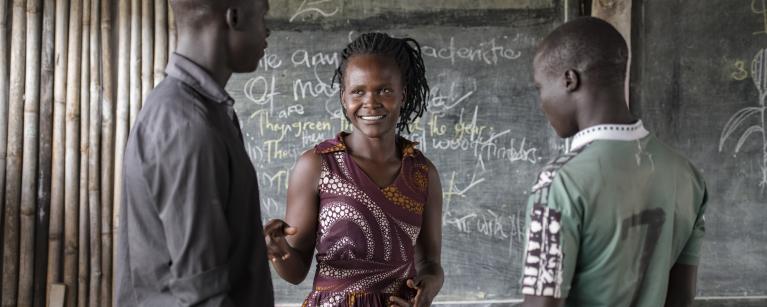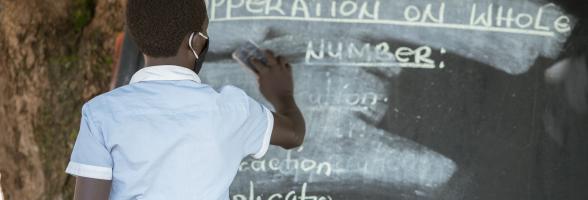Beatrice Angee, 24 years old, from Pajok in South Sudan, is a teacher at Aywee Primary and Nursery School in Palabek Refugee Settlement in Uganda.
''I come from South Sudan, and I also fled the war, so I know what the pupils here at the school have been through: soldiers coming to their villages, fleeing the country and fear of being caught and killed.
It is vital that the children go to school while staying in the settlement. They struggle a lot when they first arrive. But they like coming to school, and it helps them feel better. A lot of them want to stay in school all the time – they even come here to play when school is closed.
As a teacher, I help give the children the knowledge that eventually enables them to get a job and provide for themselves. It enriches their lives. But it is just as important that I teach them to behave themselves. Every day we talk about violence and why it is bad. I teach them to fight for peace instead of war. And when children hear these kinds of things every day, they eventually believe them to be true. This way, education can help bring peace to South Sudan.
But being a teacher here in the camp is hard work. Some of my pupils are relatively old; some of them are former child soldiers – so I have difficulties asserting myself in class, because I am relatively young. This causes problems, as the teaching is really designed to meet the needs of younger children,'' she noted.
’Education for Life’ in South Sudan and Uganda was a four-year project implemented by Oxfam and partners (2019 - 2023) under the European Union programme titled ‘Building Resilience in Crisis through Education’ (BRiCE), co-funded by Danida.
The project was anchored in the delivery of AE and short-term English language acquisition courses to displaced and out-of-school children and adolescents in Uganda and South Sudan pursue their educational dreams.
Through provision of Accelerated Education (AE), BRiCE 6,390 learners have benefitted from AE while 859 learners from language acquisition courses.
Another core component of the project was the provision of continuous Teacher and Educator Professional Development (TEPD). Building on global good practice from INEE’s Training for Primary School Teachers in Crisis Contexts (TiCC), a TEPD package was developed to meet the specific needs of teachers to enable them to support learners with different needs and backgrounds.
As a result, 22 teacher trainers from the education authorities and 855 teachers (South Sudan 393 and Uganda (462) received continuous support, supervision and training. These included regular incentives, which combined with mentorship, training, and supervision which contributed greatly to teacher attendance and retention as well as improving the quality of education delivered.
Learn more about BRiCE Project
By Rikke Hovn Poulsen

